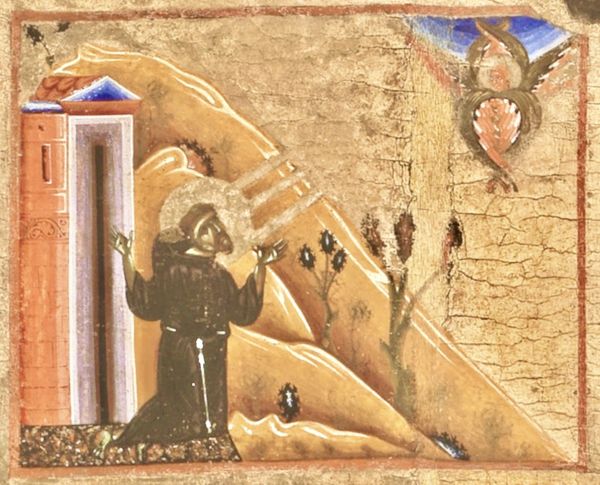The Gospel of Luke's account of the Transfiguration emphasises how Jesus' face «changed in appearance» in solitude on the mountain, in front of Peter, James, John and the dialogue about his imminent exodus with Moses and Elijah, who appeared in glory.
The Poverello also experienced his transfiguration in his existential parable.
Francis had learned that the presence of the Holy Spirit is offered to those who invoke him with familiarity, especially when they find him far from the noise of worldly people.
The Sources recount that "the man of God, remaining all alone and in peace, filled the woods with groans, sprinkled the ground with tears, beat his breast and, as if he had found a more intimate sanctuary, conversed with his Lord [...]
There, too, the friars who were piously observing him heard him call out with cries and groans to the divine Goodness on behalf of sinners; they also heard him weep aloud over the Passion of the Lord, as if he had it before his eyes.
There, while praying at night, he was seen with his hands outstretched in the form of a cross, raised from the ground with his whole body and surrounded by a luminous cloud: an extraordinary light diffused around his body, which wonderfully testified to the light shining in his Spirit.
There, moreover, as certain proofs testify, the hidden mysteries of divine wisdom were revealed to him, which he did not divulge to others, except insofar as the charity of Christ compelled him and the good of his neighbour required it [...]
When he returned from his prayers, which transformed him almost into another man, he took the greatest care to behave in harmony with others, lest the wind of applause, because of what he let slip, should deprive him of his inner reward" (FF 1180 - Leggenda maggiore).
Francis guarded his transformation into "Alter Christus" with great discretion, almost living in the cloister of his heart.
In fact, the same sources attest:
"At first, when the true love of Christ had already transformed the lover into his own image, he began to hide and conceal the Treasure with such caution that even his closest friends did not discover it for a long time.
But divine Providence did not allow it to remain hidden forever and not come to the eyes of his loved ones [...]
One of his companions, seeing the stigmata on his feet, said to him, 'What is this, good brother?
'Mind your own business,' he replied" (FF 719 - Second Life of Celano) with the frankness and simplicity that distinguished him.
«And while he prayed, the appearance of his face changed, and his white robe became dazzling» (Lk 9:29)
Transfiguration of the Lord (Lk 9:28b-36)












